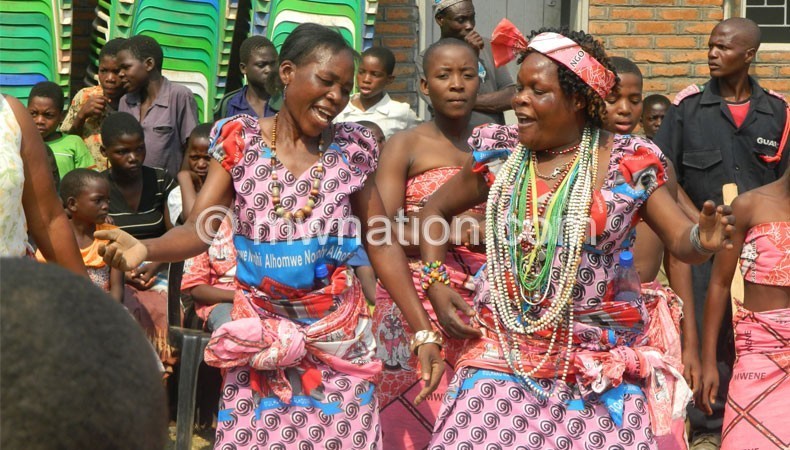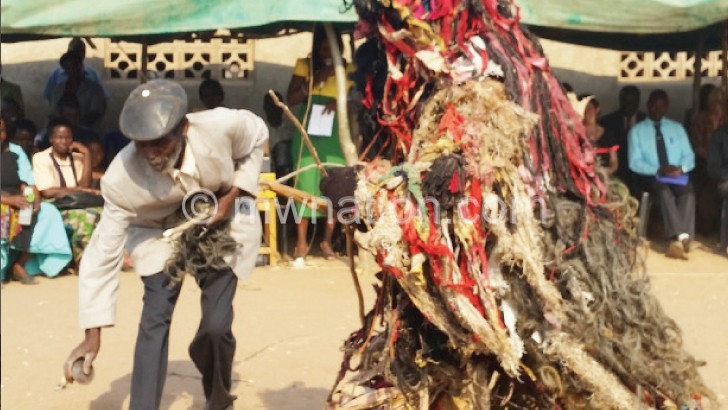Abandoning rites in the face of HIV
The Lhomwe distinguish themselves from other Malawi tribes by way of dress, food, dance and other cultural nuances.
One cannot talk of the tribe that migrated from Mozambique without mentioning their delicacies such as mtandaza (a pigeon pea-dried cassava mix), kalongonda and even snakes.

Beads represent beauty and the sacred continuity of life. Dances such as soopa are spiritual and add colour to their lives.
But most intricately, one cannot talk of the Lhomwe without mention of their initiation rites. Girls and boys are initiated into adulthood through such chinamwali as chidototo and zoma.
Initiation rites are central to the Lhomwe way of life, attests chief Magombo: “At the initiation ceremony, they tell you all about a man, his private parts as well as how to satisfy him.”
The infusion of sexual notions in the minds of young girls, some as young as five or six is now making the Lhomwe to rethink these rites.
“When young girls are subjected to this sex talk, they become curious and want to have sex with a man. For the boys, after the chinamwali, they are encouraged to have sex as a way of ‘removing dust’. This is always unprotected sex,” says the Mulanje chief.
Pressure against such counsel is rising, with religious leaders joining the battle. This is so primarily because communities feel early sexual activity leads to early marriages, teenage pregnancies, high school dropouts, high risk of sexually transmitted infections and a continued cycle of poverty and destitution.
Reverend Albert Mkumba, who comes from Gibisa Village in T/A Mabuka’s area in Mulanje, feels chinamwali such as zoma, which is for boys and girls aged between five and six should be eradicated as the main focus is on sex.
“It is these traditions that put our youths at risk of contracting HIV or getting early pregnancies. It is time we repudiated such traditions,” he says.
Dr Mtisunge Kachingwe from the College of Medicine, who is also president of the Young Women Christian Association (YWCA), says research conducted by the association revealed high correlation between some cultural norms and a host of problems resulting from early conception.
In a baseline survey conducted in three villages: Magombo, Mbewa and Nakhonyo, 377 girls aged between 15 and 24 were interviewed. It was discovered that 81.4 percent of the respondents were in a sexual relationship. It also showed that 90 percent of them had nothing to mitigate the risk of contracting HIV or any other sexually transmitted infection in their first sexual encounter.
“It is touching that 66 percent of the respondents had at least one pregnancy in their lifetime, 72 percent of which resulted in live births with 15 percent being terminated in unsafe abortions.
About 50 percent of them were not concerned about the idea of contracting HIV,” said Kachingwe.
She attributed the scenario to the initiation rites, lack of parental guidance, a knowledge gap on contraception and sexual reproductive health rights.
“It was evident from interviews and focus group meetings that traditional leaders and their subjects are turning against some cultural norms. It came out clear that ngalibas [counsellors at chinamwali] should be incorporated in sexual reproductive health programmes,” said Kachingwe.
Currently, YWCA has embarked on a programme with funding from the Norwergian arm, Norad, to create awareness on youths’ reproductive rights.
For newly installed Lhomwe T/A Ngolongoliwa, not only should some rites involving the youths be repudiated but others involving the older generation should go as well.
He cites kuthundira, where a woman who gives birth must not sleep with her husband for eight months.
“That is a tradition that has increased HIV rates among we Lhomwes. It is an archaic rite which must go.
During those eight months, the husband will definitely go and sleep with other women, exposing himself and his family to HIV,” says Ngolongoliwa, the only Lhomwe T/A.
One of his subjects, Maria Davide from Lupiya Village in Thyolo, says a lot of lies surrounded the kuthundira rite.
“We were told that if you sleep with your man before the eight months elapsed, your husband will die. For the two to start having sex again, their parents had to be involved,” she says.
But some chiefs like Nakhonyo feel repudiating initiations like zoma would erode part of the Lhomwe culture.
“An initiated child is different from an uninitiated one. It’s the same way you can spot the difference between a child who goes to school and who does not. Sex is not the only thing the children are taught,” she says. n





